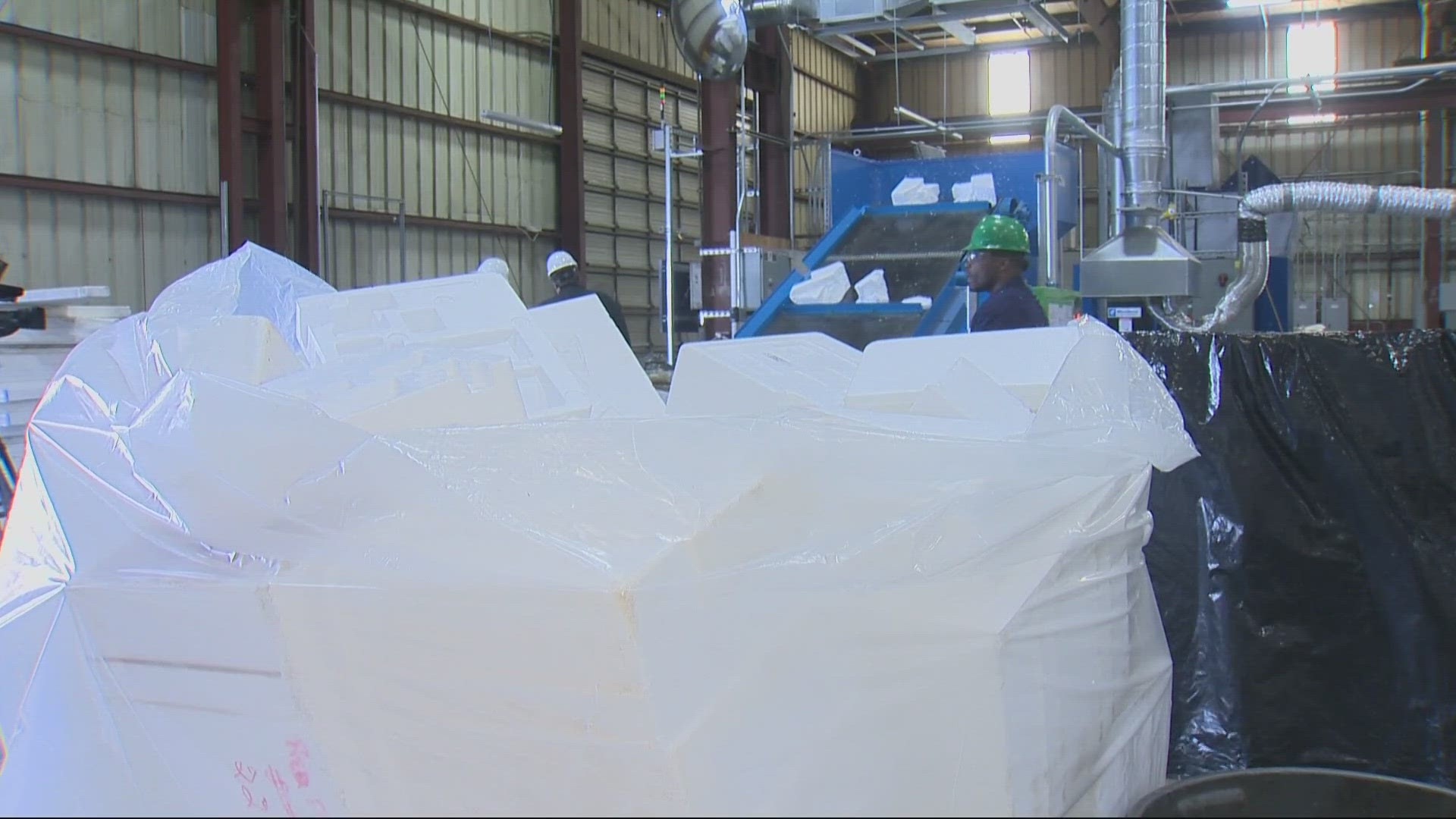TIGARD, Ore. —
Dawn Sedgwick pulled into the Agilyx facility in Tigard on Tuesday hoping to drop off some polystyrene for recycling.
“I always bring my polystyrene here because there isn’t any place else in the Portland area that takes it anymore,” she said, looking down at the sign saying the facility was out of the recycling business. “It's a major bummer.”
The company, which ran the recycling program as a joint venture with Americas Styrenics, stopped accepting polystyrene, better known as Styrofoam, on Friday, leaving the region with no alternative for recycling the packaging and packing peanuts that pad so many purchases.
“The venture was extremely successful. It proved the feasibility of what became a first-of-its-kind circular recycling model for polystyrene in the entire U.S.,” said Mark Barranco, senior vice president of engineering and execution for Agilyx.
So if it was so successful, why shutter the program, which has been taking in polystyrene since 2019?
“This was envisioned as a five-year project. It had a number of objectives established for it,” Barranco said. “So, this demonstrated a circular pathway from taking post-used polystyrene and making new polystyrene. We've basically checked all those boxes, as far as those objectives are concerned.”
Beyond that, the scale of the facility didn’t make sense to keep operating as anything beyond a demonstration of the concept, Barranco said.
“It's a small-scale facility,” he said. “It's dated, and it's just not economic to continue to invest and upgrade and support its ongoing operation.”
Polystyrene is a tricky material to recycle. Agilyx had been doing so using pyrolysis, a chemical process that involved high temperatures and low oxygen, which separated the waste from the parts of the material that could be reused.
“It is feasible to take post-use polystyrene, redirect it from going to a landfill, and then, turn it into new polystyrene products,” Barranco said.
Not everyone was convinced of the environmental benefits, however.
A 2022 report from the Natural Resources Defense Council questioned the efficiency of polystyrene recycling and of Agilyx’s operations in particular.
“This facility in fact produces a large volume of styrene that is shipped offsite to be burned instead of being converted into new plastic,” the report reads. “Since 2018, Agilyx has shipped hundreds of thousands of pounds of styrene across the country to be burned.”
Citing data from the Environmental Protection Agency and the Oregon Department of Environmental Quality, the report noted that in 2019 alone, Agilyx sent more than 480,000 pounds of waste to third parties for “energy recovery.” Energy recovery often means the waste material is burned, and the heat is used to create energy.
Barranco acknowledged that the process does create some hazardous byproducts but said that isn’t abnormal in the industry.
“They produce byproducts, and these byproducts are not unlike any other manufacturing process that have byproducts,” he said. “Depending on that type of plastic, that byproduct could be deemed as hazardous.”
He did note that 2019 was an outlier, as the program was just getting up and running. Over the course of the five-year endeavor, Barranco said that roughly 20% of the 6 million pounds of polystyrene that was processed ended up as waste.
Even with that, however, he said the plastic pollution crises has grown to the extent that something must be done.
“This plastics waste issue is serious. We know it's reached crisis proportions,” he said. “It's a global crisis for the industry.”
Agilyx is planning to open several larger facilities that focus on polystyrene recycling, including the largest one in Japan that is nearly set to open.
Asked what Portland-area residents should do with their polystyrene, Gia Ballash, a spokeswoman for Metro, said there aren’t any real options besides tossing it in the trash.
“It may feel wrong to throw these items away, but knowing what is and isn’t recyclable and keeping garbage out of recycling bins is vital to making sure that the garbage and recycling system continues to work well for people and the environment,” Ballash said.
Though Ridwell has also been an option for Portland residents to dispose of hard-to-recycle items such as Styrofoam, the company has historically taken the polystyrene they receive to Agilyx.
“We are researching alternative partners and hope to have a new local option soon," a Ridwell spokesperson told KGW. "In the meantime, we are transporting all polystyrene (styrofoam) picked up in the Portland area to another Pacific Northwest partner, StyroRecycle in Kent, Washington. Ridwell members will experience no lapse in polystyrene pickup service.”
In other words, Ridwell will still take Styrofoam — but some of the environmental benefit is lost because it needs to be driven all the way to King County, Washington, instead of it being dropped off in Tigard.
There may be some better solutions on the horizon, though.
Barranco said Agilyx is in talks with some third parties to reopen collection of polystyrene at their facility in Tigard. The material would then be transported to a recycler, which would cut into its environmental benefit.
Ballash pointed to the Recycling Modernization Act, passed by the legislature in 2021, which will change the way recycling works in Oregon. By July 1, 2025, recycling facilities in the Portland area will begin accepting polystyrene that is destined for recycling plants.
Even better than that, Ballash said, is to just use less of it.
“Reducing Styrofoam use overall can have greater environmental impacts than recycling alone,” she said. “Metro encourages people to avoid buying and using Styrofoam products when possible.”
That doesn’t do much for people like Dawn Sedgwick, who’d gotten used to having a polystyrene recycler close by.
“I have absolutely no idea what I’m going to do because this was literally the only place in the area that would take it,” she said. “That really stinks.”

